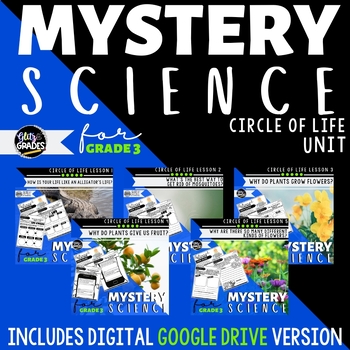Mystery Scicence 3rd Grade SUPPLEMENT Circle of Life BUNDLE Life Cycles
- Zip
What educators are saying
Products in this Bundle (5)
Bonus
Also included in
- This Mystery Science Bundle SUPPLEMENT includes journal pages for all 5 units in the 3rd Grade Mystery Science Curriculum with an additional Distance Learning Google Drive Digital Version so students can type in their answers! THIS PRODUCT IS NOT INTENDED TO BE USED WITHOUT ACCESS TO THE MYSTERY SCIPrice $46.00Original Price $92.00Save $46.00
Description
This Mystery Science SUPPLEMENTAL Bundle includes journal pages for all 5 Mysteries in the 3rd Grade Circle of Life unit with an additional Google Drive Digital Version so students can type in their answers.
THIS PRODUCT IS NOT INTENDED TO BE USED WITHOUT ACCESS TO THE MYSTERY SCIENCE CURRICULUM.
These supplemental journal pages are the perfect way to keep your students engaged and accountable throughout the mysteries! There are endless ways you can implement these journal pages in your classroom - while the students watch the videos, as a homework assignment, during cooperative learning structures, or as an assessment.
This product has been created to supplement the Mystery Science curriculum found at https://mysteryscience.com/. It is not intended to be used without the curriculum.
The following products are included in this cost-efficient BUNDLE!
WHAT YOU GET:
Mystery 1 - How is Your Life Like an Alligator's Life?
Animal Life Cycles
- 2 Journal Pages
- 2 Answer Keys
- 1 Optional Teacher Guide
Mystery 2 - What's the Best Way to Get Rid of Mosquitoes?
Animal Life Cycles
- 2 Journal Pages
- 2 Answer Keys
- 1 Optional Teacher Guide
Mystery 3 - Why Do Plants Grow Flowers?
Pollination
- 2 Journal Pages
- 2 Answer Keys
- 1 Optional Teacher Guide
Mystery 4 - Why Do Plants Give Us Fruit?
Plant Life Cycle
- 2 Journal Pages
- 2 Answer Keys
- 1 Optional Teacher Guide
Mystery 5 - Why Are There So Many Different Kinds of Flowers?
Plant Life Cycle & Pollination
- 2 Journal Pages
- 2 Answer Keys
- 1 Optional Teacher Guide
Permission has been obtained from mysteryscience.com to post this product.
What are other teachers saying about these resources?
"Game changer! I love these worksheets that go along with the Mystery Science lessons! They are more visually pleasing (sorry Doug) than the ones offered. We use them in class along with the ones Mystery Science provides (which is very writing heavy and difficult for my low SES community and stifles their creativity because they start freaking out about spelling, wording, poor handwriting, etc). These help the students hone in on those vocabulary words that our kids are unfamiliar with and then helps them understand the concept better. MY KIDS LOVE MYSTERY SCIENCE! And so do I! I don't have a science brain and I love that there is something that can help me teach fun content in such a fun and simple way that doesn't limit their learning just because their teacher doesn't get it. Thanks for the resource! They help me too!" - Kerri R. on the 4th Grade Super Bundle
"This resource provided more engagement for my students while going through the mystery science lessons. It provided opportunities for students to critically think and explain themselves during some of Doug's questions before starting the hands-on portion of the mystery." - Carolyn M. on the 3rd Grade Invisible Forces Bundle
Teaching Other Grades? Be sure to check out the 4th and 5th Grade Mystery Science Bundles as well!
- Mystery Science 5th Grade Super Bundle All 4 Units
- Mystery Science 4th Grade Super Bundle All 4 Units
Did you know you can earn FREE TPT money?
Earn free TPT credits by reviewing your purchases! Each time you leave a review for a product that you purchased, you earn credits to use toward your next purchase.
Let's Connect!
I'd love to connect with you on Instagram! Follow @glitzandgrades for product updates and info. I love seeing products in action! Feel free to tag @glitzandgrades in any posts where you are putting @glitzandgrades products to use!
Thank you so much for your interest in Glitz and Grades teaching products.






